Easy Jewish Recipes: Heartwarming, Traditional & Effortless Dishes 🥘🌿✨
1. Introduction
Jewish cuisine is a beautiful tapestry of flavors, traditions, and comfort foods that have been passed down through generations. Whether you’re preparing for Shabbat, celebrating Jewish holidays, or simply craving wholesome, flavorful meals, these easy Jewish recipes will bring warmth and joy to your table. From savory cholent that simmers overnight to tender brisket that melts in your mouth, these dishes are surprisingly simple to prepare yet deliver deep, satisfying flavors that will have your family asking for seconds.
If you’re looking for more comforting meal ideas, check out our collection of hearty dinner recipes that pair perfectly with these traditional Jewish dishes.
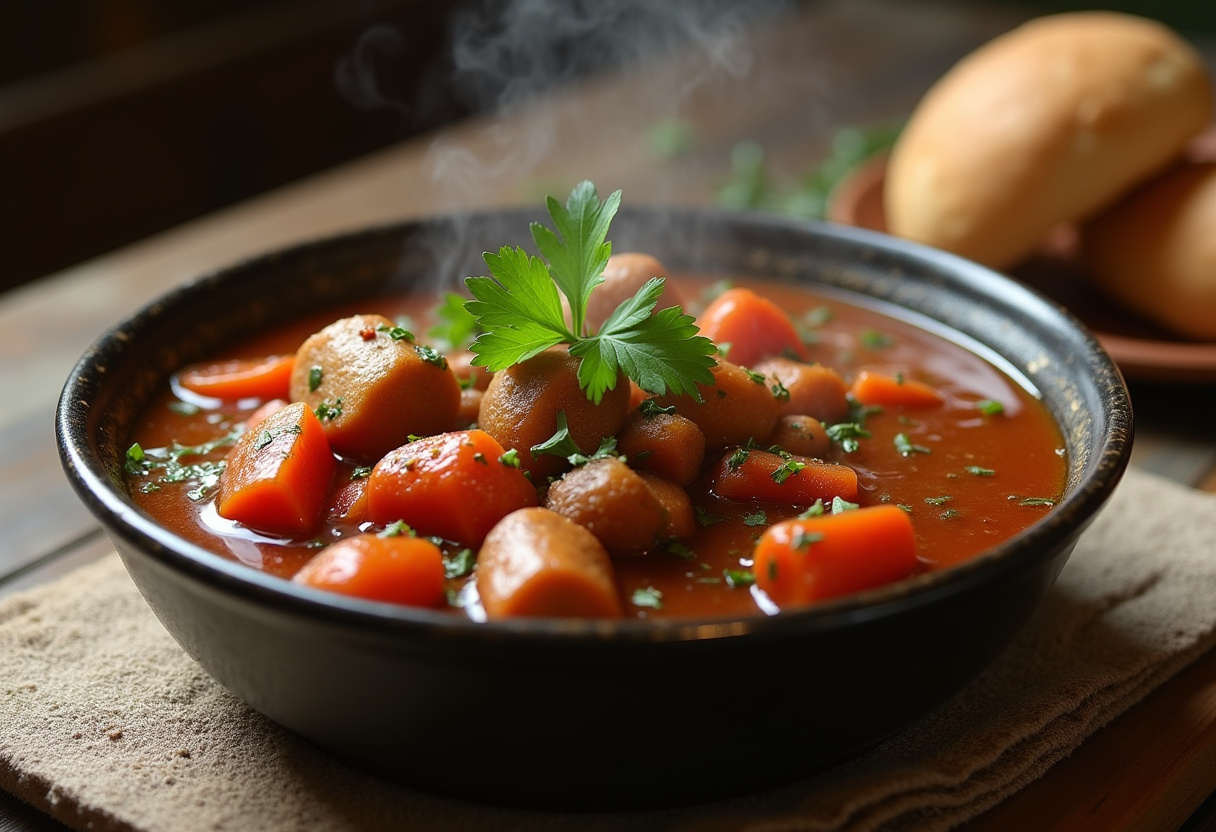
2. Ingredients
To make this classic Jewish stew that’s perfect for Shabbat or any family gathering, you’ll need these simple, wholesome ingredients:
- 1 lb beef chuck, cubed (for a kosher version, ensure it’s properly prepared)
- 2 tbsp high-quality olive oil
- 1 large yellow onion, diced
- 3 carrots, chopped into thick coins
- 3 celery stalks, chopped (including the leaves for extra flavor)
- 3 cloves garlic, minced
- 4 cups rich beef broth (vegetable broth works for a pareve version)
- 1 tsp sweet paprika
- 1 tsp fresh thyme leaves (or ½ tsp dried)
- Sea salt and freshly ground black pepper to taste
- Fresh parsley for garnish (curly or flat-leaf both work well)
For those who enjoy baking, you might want to try our fluffy sourdough hot dog buns as a perfect side to complement this hearty stew.
3. Step-by-Step Instructions
Step 1: Prepare the Vegetables
Begin by thoroughly washing all your vegetables under cold running water. Peel the carrots if desired (organic carrots often don’t need peeling) and chop them into thick coins about ½-inch wide. Dice the onion into medium pieces – not too fine as they’ll cook down significantly. Chop the celery, including the flavorful leaves which add wonderful depth to the stew. Mince the garlic cloves finely so they distribute evenly throughout the dish.
This careful preparation is similar to the attention we give when making our moist sourdough blueberry bread, where ingredient prep makes all the difference.
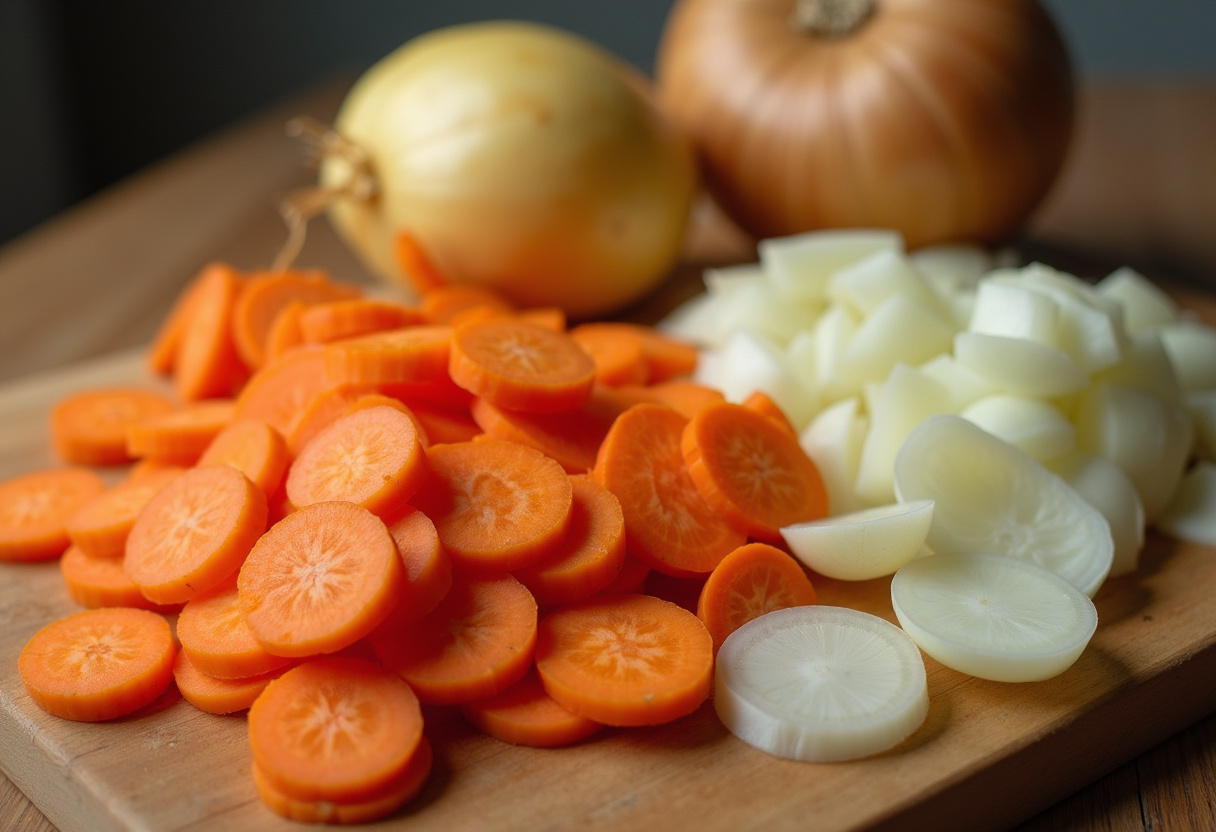
Step 2: Sauté the Aromatics
Select a heavy-bottomed pot or Dutch oven (a 5-6 quart size works well) and heat the olive oil over medium heat until shimmering but not smoking. Add the chopped onions first, stirring occasionally until they become translucent – about 3 minutes. Then add the carrots and celery, continuing to sauté until all vegetables have softened slightly but still retain some texture – about 5 minutes total. Stir in the minced garlic during the last 30 seconds to prevent burning, as garlic can turn bitter if overcooked.
This technique of layering flavors is fundamental in Jewish cooking, much like the careful process we use when making our sourdough monkey bread.
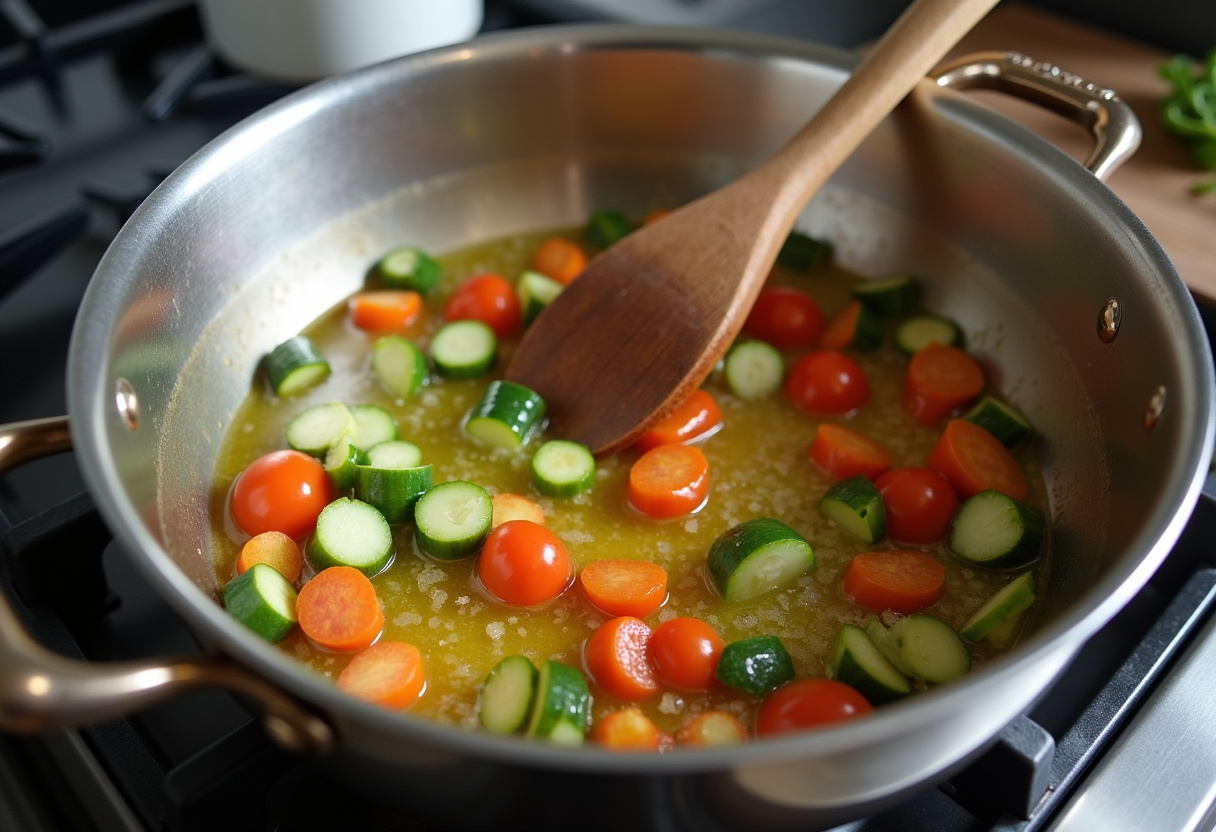
Step 3: Brown the Meat
Increase the heat to medium-high and add the cubed beef in a single layer, working in batches if necessary to avoid overcrowding the pot. Allow the meat to develop a deep brown crust on one side before turning – this caramelization (called the Maillard reaction) is crucial for developing rich, complex flavors in your stew. Use tongs to turn the pieces and brown on all sides, about 6-8 minutes total. Don’t worry about any browned bits sticking to the pot – these will dissolve later and add incredible depth to your broth.
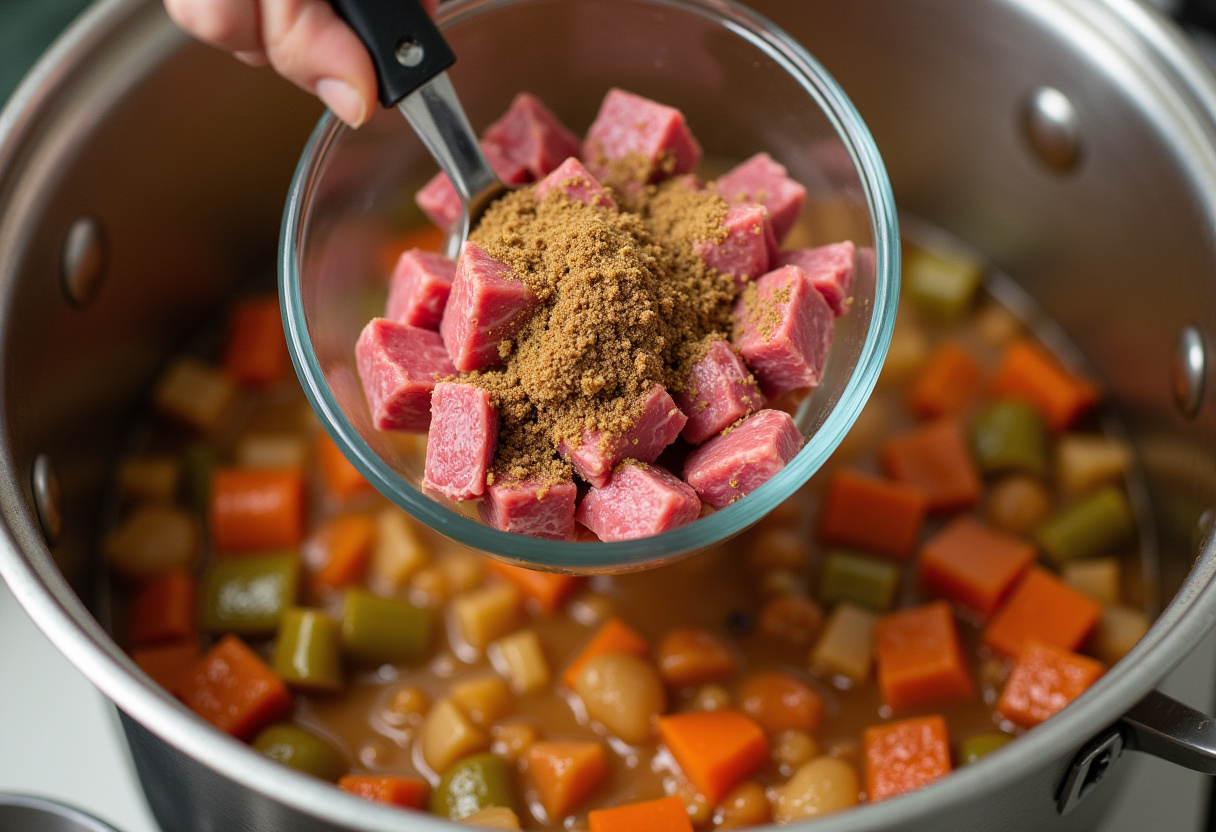
Step 4: Simmer to Perfection
Pour in the beef broth, using a wooden spoon to scrape up any flavorful browned bits from the bottom of the pot. Add the paprika, thyme, salt, and pepper, stirring to combine all ingredients evenly. Bring the mixture just to a boil, then immediately reduce the heat to low, cover with a tight-fitting lid, and let simmer gently. The low, slow cooking (1.5-2 hours) allows the tough collagen in the beef to break down into gelatin, resulting in incredibly tender meat and a luxuriously thick broth.
For more slow-cooked recipe inspiration, explore our dinner recipe collection featuring various cuisines and techniques.
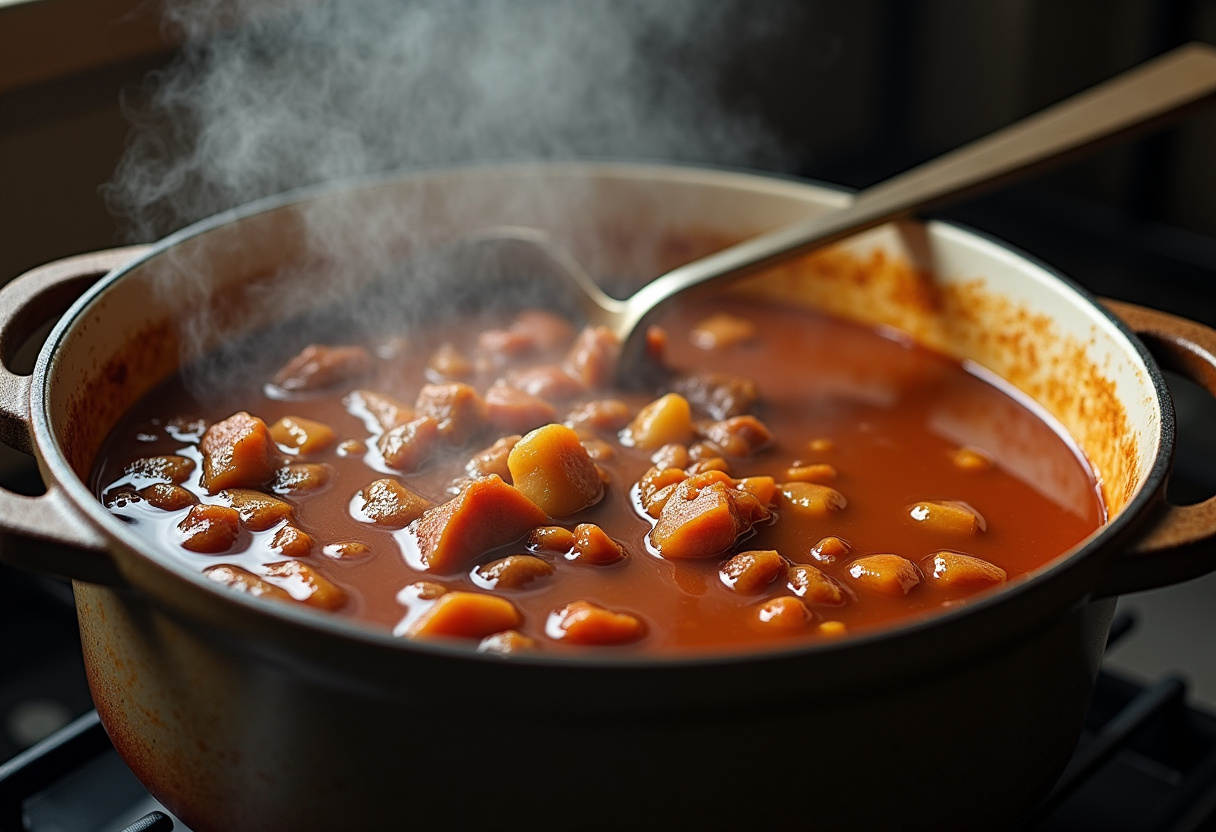
4. Serving Suggestions
This hearty Jewish stew is incredibly versatile when it comes to serving options. For a traditional presentation, ladle it into deep bowls and serve with thick slices of crusty challah or rye bread to soak up the delicious broth. If you prefer a more substantial meal, spoon it over a bed of fluffy mashed potatoes or buttery egg noodles. Garnish each serving with a generous sprinkle of fresh parsley for color and brightness. For a complete Jewish meal experience, start with matzo ball soup and finish with our sourdough oatmeal cookies for dessert.
5. Variations
Jewish cooking is wonderfully adaptable to different dietary needs and preferences. For a lighter version, substitute the beef with bone-in chicken thighs (increase cooking time to 2 hours) or hearty mushrooms like cremini or portobello (reduce cooking time to 30 minutes). During Passover, you can add peeled and cubed potatoes or turnips instead of barley. For a Sephardic twist, include chickpeas, cumin, and a pinch of saffron. The team at Ronnie Fein’s Jewish food blog offers excellent inspiration for regional variations.
6. Storage Tips
Like many Jewish dishes, this stew actually improves in flavor after a day or two in the refrigerator. Store cooled leftovers in airtight containers (glass works best to prevent staining) for up to 3 days in the refrigerator or up to 3 months in the freezer. When reheating, add a splash of broth or water to thin the consistency if needed, and warm gently over low heat to prevent the meat from becoming tough. This makes it an excellent make-ahead option for Shabbat or busy weeknights.
7. Health Benefits
This nourishing stew offers numerous health benefits. The beef provides high-quality protein and iron, while the carrots deliver beta-carotene (which converts to vitamin A) and fiber. Celery adds antioxidants and anti-inflammatory compounds, and garlic offers immune-boosting properties. Using olive oil as the cooking fat contributes heart-healthy monounsaturated fats. For those watching their sodium intake, use low-sodium broth and adjust seasoning at the end.
8. Frequently Asked Questions
Can I make this stew in a slow cooker? Absolutely! This method works beautifully for busy cooks. After browning the meat and sautéing the vegetables on the stove (don’t skip this step for maximum flavor), transfer everything to your slow cooker. Cook on low for 6-8 hours or high for 3-4 hours. The longer cooking time will make the meat exceptionally tender.
Is this recipe kosher? Yes, when prepared with kosher-certified ingredients. Use kosher meat that’s been properly soaked and salted (kashered), and ensure all other ingredients have reliable kosher certification. For strict kosher observance, keep dairy products separate from meat dishes.
Can I make this vegetarian? Certainly! Replace the beef with mushrooms, eggplant, or chickpeas, and use vegetable broth. Add 1 tablespoon of tomato paste for richness if desired. The cooking time will reduce to about 30 minutes for vegetables.
9. Conclusion
These easy Jewish recipes represent more than just food – they’re edible history, connecting us to generations past while nourishing our families today. Whether you’re maintaining family traditions or discovering Jewish cuisine for the first time, this comforting stew is a perfect introduction to the warmth and richness of Jewish cooking. The simple techniques yield impressive results, proving that great flavor doesn’t require complicated methods. For more about our approach to traditional cooking, visit our About Me page. Remember to check our disclaimer for important information about our recipes. May your kitchen be filled with the wonderful aromas and joy of Jewish cooking!
Print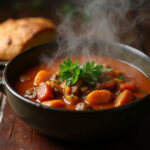
Easy Jewish Recipes
- Total Time: 2 hours 15 minutes
Description
This classic Jewish stew is a comforting, hearty dish packed with tender beef, aromatic vegetables, and rich flavors. Perfect for Shabbat, holidays, or a cozy family dinner, this easy recipe brings tradition to your table with minimal effort.
Ingredients
- 1 lb beef chuck, cubed
- 2 tbsp olive oil
- 1 large onion, diced
- 3 carrots, chopped
- 3 celery stalks, chopped
- 3 cloves garlic, minced
- 4 cups beef broth
- 1 tsp paprika
- 1 tsp thyme
- Salt and pepper to taste
- Fresh parsley for garnish
Instructions
- Prepare the vegetables by washing and chopping onions, carrots, and celery into even pieces.
- Heat olive oil in a large pot over medium heat. Sauté onions, carrots, and celery until softened (about 5 minutes). Stir in minced garlic.
- Add cubed beef to the pot and sear until browned on all sides.
- Pour in beef broth and season with paprika, thyme, salt, and pepper. Bring to a boil, then reduce heat and simmer for 1.5–2 hours until meat is tender.
- Garnish with fresh parsley and serve with crusty bread or mashed potatoes.
Notes
- For a lighter version, substitute beef with chicken or mushrooms.
- Add potatoes or barley for extra heartiness.
- Store leftovers in an airtight container in the fridge for up to 3 days or freeze for up to 3 months.
- Reheat gently with a splash of broth to revive flavors.
- Prep Time: 15 minutes
- Cook Time: 2 hours
Nutrition
- Serving Size: 1 bowl (approx. 1.5 cups)
- Calories: 320 Kcal
- Sugar: 5g
- Sodium: 650mg
- Fat: 18g
- Saturated Fat: 6g
- Unsaturated Fat: 10g
- Trans Fat: 0g
- Carbohydrates: 12g
- Fiber: 3g
- Protein: 28g
- Cholesterol: 80mg
Keywords: easy Jewish stew, traditional Jewish recipe, kosher beef stew, Shabbat dinner, hearty Jewish dish





No comment